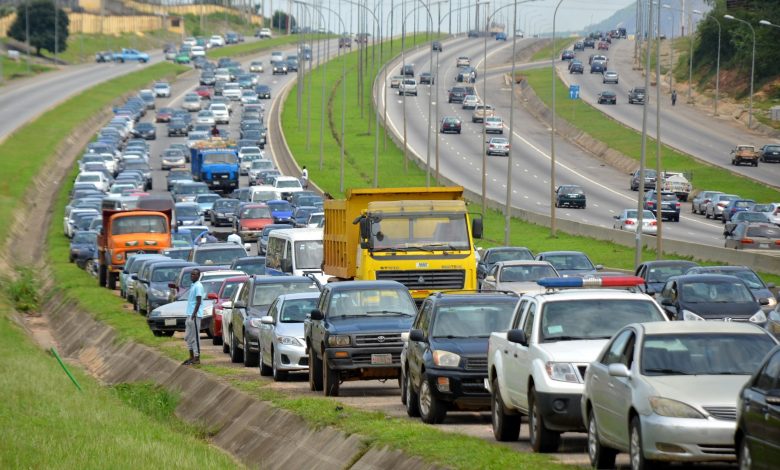#COVID19 Lockdown: Nigerians Flee Abuja, Lagos In Large Numbers
Residents in Nigeria's economic and administrative capital, Lagos and Abuja, are starting to exit in droves to avoid COVID-19 lockdown.

On Monday, March 30, hours before the COVID-19 induced lockdown started, several Nigerians in Lagos and Abuja, most of whom are daily wage labourers, staged an exodus. In large numbers, they fled to the surrounding cities or their indigenous states not yet affected by the lockdown.
The fleeing populace was evidently stung by the lockdown announced by President Muhammadu Buhari on Sunday.
Eyewitnesses report that while panic buying was going on by people who could afford to buy food and necessities, trucks were loaded with middle to lower-class families desperate to escape the impending government order.
For those who could afford buses, they cramped in, braving the sudden fare hike. Not to flee, for several of them was tantamount to submitting themselves and their families to a life of willful starvation.
By evening, in the satellite communities of Abuja, the streets appeared ghostly, without the usual rustling and noise of commercial motorcyclists, suya sellers, and wage workers.
Some other people fled the cities for neighbouring suburbs, where they could maintain familiar routines.
To curb the spread of COVID-19, President Buhari had announced a 14-day lockdown which began at 11 pm on Monday. This includes border shutdown and highly restricted movements within the FCT and Lagos.
The concern that the pandemic was gaining momentum in Nigeria seems real. As of Monday night, Nigeria had 131 COVID-19 cases and two deaths. While the motive behind the lockdown was to curb the spread, respondents told HumAngle that it put wage workers and the poor at a disadvantage.
To combat this, the government announced that it has begun the process of remitting conditional cash to the poor and vulnerable without stating how it obtained the data and whereabouts of the poor households in Nigeria.
Aliyu Muazu, who works as a commercial motorcyclist in Abuja, told HumAngle that he heard that the poor, like himself, would be given funds but did not trust the information.
To pre-empt the disappointment, Muazu sent his sons to Kano through a truck that left Monday evening. He said, “Government’s promise is not certain and I know with the lockdown, I won’t find work.
“So, I sent my children home so hunger will not kill them here. I don’t have any food in stock at all,” he said.
The situation is not different for Chidinma Azubuike, a petty tailor and her family, who moved to Suleja, Niger State to stay with her sister.
“Who will mend clothes during lockdown?” She asked the HumAngle reporter who spoke to her. “I have not received any alert (bank credit) from the government and I cannot put my children in danger.
“There will be no movement and prices have tripled in the market. From 700 Naira, Garri went to 1, N500 for a measure of a kilogramme.
“I don’t even make that in a week. My sister opened her house to us and there is no restriction here. We would stay till things go back to normal,” she said.
In Lagos, reports of people fleeing to neighbouring Ibadan, Oyo State and other Southwest states emptied the city.
Betty Owolabi, who stays with her family in Lagos, helped her neighbour pack. She said, “My neighbour left this afternoon (Monday). She wants to be with family at this time since her makeup business is pretty grounded for now.
“This evening, we also saw trucks loaded with motorbikes and the bike men heading out of the city. People are fleeing,” she said.
It is unclear how and when the palliative cash President Buhari released for the vulnerable in the society will be disbursed. Meanwhile, security agents have been deployed to enforce the lockdown.
Support Our Journalism
There are millions of ordinary people affected by conflict in Africa whose stories are missing in the mainstream media. HumAngle is determined to tell those challenging and under-reported stories, hoping that the people impacted by these conflicts will find the safety and security they deserve.
To ensure that we continue to provide public service coverage, we have a small favour to ask you. We want you to be part of our journalistic endeavour by contributing a token to us.
Your donation will further promote a robust, free, and independent media.
Donate HereStay Closer To The Stories That Matter




